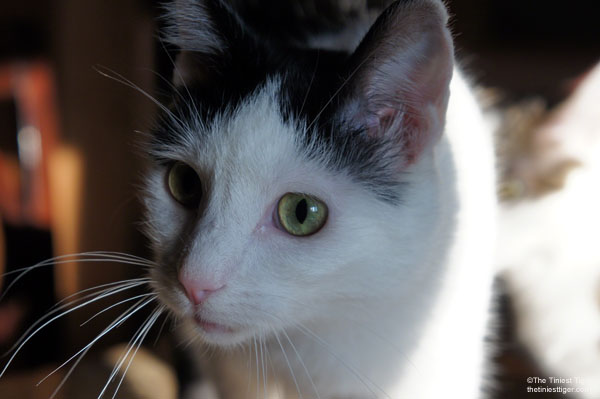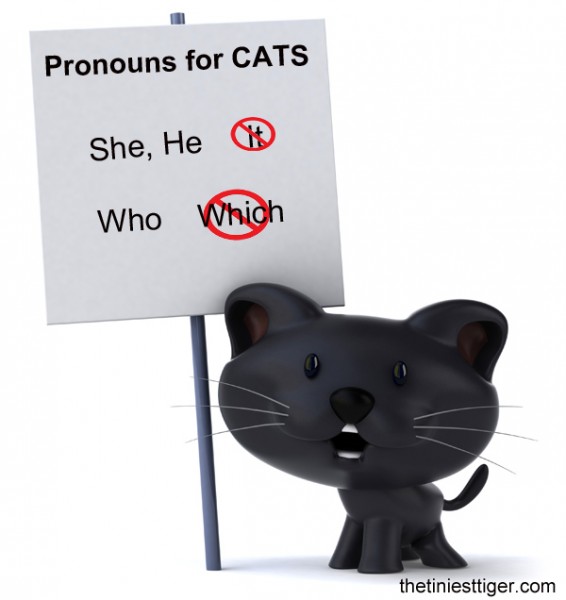Cats Are Not Things, They Are Living Beings
We all have certain trigger points. Me, I can run my fingernails down a chalkboard and it doesn’t bother me in the least. But other sounds, even certain words and how they are used can either send a shiver down my spine or cause me to interject and correct the other person. When I hear a person say Illinois with the s on the end, I shiver a little but I don’t feel compelled to correct them. But when I hear someone refer to a cat as “it”, I automatically interrupt and say, she or he, cats are not things they are living beings. “It” is one thing you should never call a cat or any animal.
Yesterday I was looking over student projects. There is a peer review requirement where one student evaluates another student’s work to help with clarity, grammar, formatting and content. One of the students corrected another student’s use of the pronoun “she” referring to a big cat. In the track changes I saw “she” deleted and ” it” was inserted. I sat back in my chair and let out a long heavy sigh.
The Power of One Word
There is power in the words we choose to use when referring to an animal. “It” refers to an animal as a thing, an object, as property.
I remembered a conversation with a vendor at the Alley Cat Allies conference . She was explaining how we could microchip our own cats. I answered that I would not feel comfortable inserting a chip into my cats as I am not a veterinarian. She responded, your cats are your property. You can do whatever you want with them.
cats are living beings, not things
That made me shiver and I calmly replied, cats are not property. They are living beings, not things. Yes, it was awkward. But it is important to remind others whenever we get a chance that animals are not things. If we are to continue to make progress for the humane treatment of animals, we cannot remain quiet when another refers to animals as things. It is a subtle but powerful distinction.
The Choice of Pronoun Matters
When Jane Goodall submitted her first scientific paper for publication on her groundbreaking research on the social life of chimpanzees in Tanzania, the paper was rejected. The publisher returned the paper replacing every “he” and “she” with “it” and every “who” with “which” where Goodall referred to individual animals. Goodall changed every word back to its original form and resubmitted refusing to back down. This was unprecedented and the paper was eventually accepted.
She or He Please, Animals are not Its
As part of the global birthday celebration for Dr. Goodall’s 80th birthday, there was a Google+ Hangout on Air that was hosted in conjunction with Google Earth Outreach and Connected Classrooms. About 27:17 minutes into the 30 minute hangout, the host from National Geographic refers to a chimp as “it” and Goodall quietly yet sternly interrupts and says, “She please. Animals are not its.” 50 years later, Dr. Goodall is gently reminding others that animals are not things.
So yesterday, I sat back up in my chair, and I deleted the “it” referring to the big cat and reinserted the original “she” into the student’s paper. The pronoun matters when we speak and write about animals.


This is an often overlooked subject which I’ve found offensive forever! Thanks for raising it, Joanne… I wouldn’t call any of my family members “it” – my cats OR my husband… 🙂
Most of us know of Jane Goodall and her work. She really is quite a pioneer in so many ways as it relates to animals. I will have to watch that Hangout in celebration of her 80th. What an amazing woman! And thank you for your post, Joanne, on the proper usage of pronouns as they relate to animals. They do indeed matter!
I so agree with this post! I HATE it when people refer to their pets as things or objects. My girls are always referred to as “she”. If anyone referred to them otherwise they’d have an argument for sure.
At least a gentle reminder. I think it is important to correct someone that refers to an animals as it. Thank you for reading the post.
The most disturbing thing I hear is when people call a baby or child “it”. I start to wonder about abuse at that point because objectifying the living being is part of dissociating to be able to treat something alive as an object. Glad to know I am not alone. It makes me physically twitch when I hear. How is it?
That is tough to hear about a child for sure. Yes, it is an important distinction.
Thank you for bringing this up, Joanne! It’s long been an annoyance to me, too. The rule in the Associated Press Style Manual (once considered the Bible for all newspaper journalists, but since there are hardly any newspapers any more …) is that if the animal has a name, it’s a “he” or a “she” — I’d go the extra step, though, and try to know if it’s male or female.
When I was watching the google hangout of Jane Goodall’s birthday party and I heard the National Geographic host say it about the chimp, I thought….uh oh… and sure enough, Dr. Goodall corrected him. She is awesome.
I would of cringed if I heard someone said it’s your property you can do whatever you want about a cat. Just thinking about that one upsets me. Words do really speak volumes don’t they.
Sue B
Yes. And you can do whatever you want to your cat. It was an awkward moment for sure.
BRAVO Joanne !!
The only “it” that can lay claim to that name is Cousin It; Addams Family 1964- 1966
This is no different than if our pets called us all …”hey you “
Cousin It. That is a very good point. Thanks for stopping by!!
It is only in the past several years that style books have been revised to allow the usage of the personal pronouns he or she for animals when the gender of the animal is known. When I first started in the business, I received sharp reprimands from senior editors for using “he” or “she” for an animal even when the gender was known. Change is hard, especially for curmudgeonly editors. Stand your ground, Joanne.
50 years later and Dr. Goodall is still kindly reminding others not to refer to animals as “it”. She is amazing. Yes, I read an article about how many publications still do not permit the use of he/she for animals. Change is hard but slow and steady. Thanks for reading, Jean and being part of our community.
Oh Joanne. How I admire you! Thank you for this beautiful and true statement!
Denise, thank you for your kind words. Little things make a big difference. Thank you for being a part of The Tiniest Tiger community.